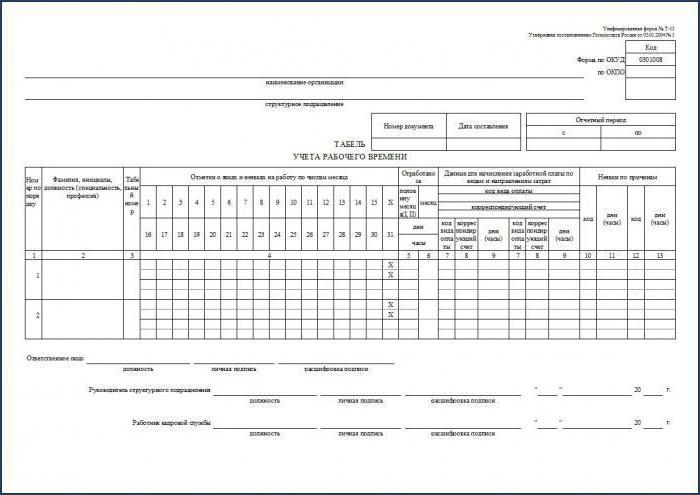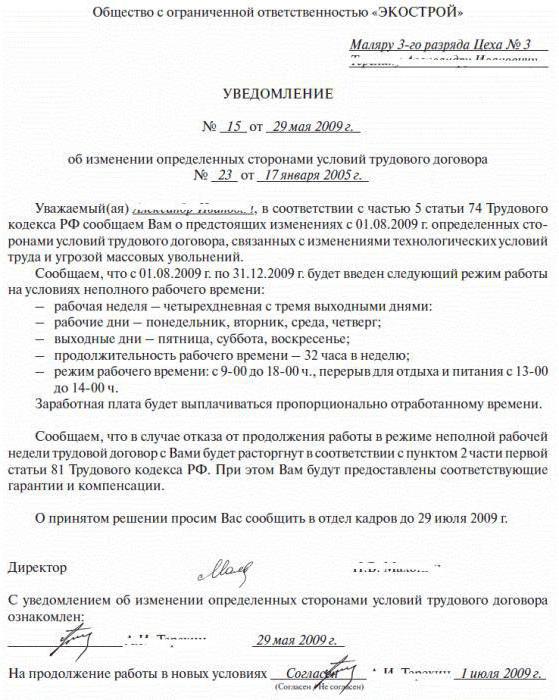The working week can be regulated at the legislative level or by agreement between the parties. In addition to a full working week containing 40 hours, there is such a thing as a shortened working week. Let us consider in more detail what its features are and how it differs from a part-time week.
What the law says
A working week cannot exceed 40 hours - this is evidenced by Russian law. Moreover, this is relevant for both a five-day and a six-day work week. For the first case, the working day is limited to 8 hours, but in the second case, each employer sets the regime individually, taking into account the fact that the day before the weekend should not exceed 5 hours.

Based on legal regulations, other operating modes can also be calculated.
But at the same time, a shorter work week can be set for certain categories of employees.
Shortened work week
Reduced work regime implies that the employee will work in fact fewer hours compared with the usual mode for the same period of time. According to Article 92 of the Labor Code of the Russian Federation, a shortened working week is set for the following categories of persons:
- under 16 years of age (they should work no more than 24 hours a week);
- older than 16 years, but not under the age of 18 (they are required by law to work no more than 35 hours);
- having a disability of 1 or 2 groups (the labor activity of these persons should not exceed 35 hours);
- workers whose working conditions are defined as hazardous or unhealthy (in this case, the labor week may not exceed 36 hours).
This list is not final. It can be supplemented with facts from federal law. For example, the reduced working week for teachers is 36 hours, and for health workers is 39 hours. At the same time, there is a decree of the Government of the Russian Federation, which presents a list of specialties of medical workers and types of medical facilities for which the working week has been reduced to an even greater extent.
Payment Features
A labor week of this type will be paid as full, but subject to some exceptions. A shorter work week under the labor code for minors will be paid according to the actual hours worked or the amount of work performed. In other words, the work is paid in proportion to these indicators.

But, despite the legislative regulations, the employer has the right to make additional payments to its employees, who work in shorter periods. In particular, he can pay for work at the same rate as employees who are on a full-time week, but under certain conditions.
How should the payment of additional funds proceed if the employee has a shortened working week? Payment should be made as compensation for overtime work.
What an incomplete week gives up on shortened
In some cases, an employee may be given a part-time job. But this concept is significantly different from the concept of “shortened work week”.
If the week is incomplete, payments are made upon the time worked and the work performed, and if the time is shortened, the labor week can be considered full for certain individuals and paid in full.Further, for the appointment of an incomplete work week, mutual agreement of both parties or the initiative of the employee is sufficient, a shortened week is provided to a specific group of persons.
An incomplete week may be introduced if the employer has been contacted by:
- female employee in position;
- one of the parents of a child who has not reached the age of 14;
- one of the parents of a disabled child under the age of 18;
- a person who cares for a sick relative with the provision of a relevant certificate from a medical institution.
A manager can organize a part-time work week only on the basis of the application of these persons.

At the same time, there should not be a record in the work book that the employee has a shortened working week or part-time.
Time tracking
It is the employer's direct responsibility to take into account working hours, not his right or desire. Although many neglect this fact, thereby violating the requirements of legislative acts.
To keep a record of the time worked out upon the fact of each employee, a special report card of the T-12 form is used, which is approved by the resolution of the State Statistics Committee of the Russian Federation. In addition to the fact that this document has its intended purpose, it can still be taken into account as evidence in litigation within the framework of labor legislation.

Reduced hours in hours:
- Persons under 16 years old - 24 hours.
- Persons from 16 to 18 years old, disabled people of groups 1 and 2 - 35 hours.
- Persons working under the influence of negative factors - 36 hours.
If a minor citizen combines study and work, then half of the norm of the law is applicable to him. I.e:
- Persons under 16 must work no more than 12 hours a week;
- persons from 16 to 18 years old - no more than 17.5 hours a week.
To establish a reduced working week, taking into account the norms of labor law and federal laws, it is necessary for the following categories of employees, observing hourly standards:
- For teaching staff - 36 hours.
- For health workers - from 30 to 39 hours.
- For women working in the village - 36 hours.
- For women working in the Far North - up to 36 hours.
As a result, all these facts should be taken into account in the time sheet.
Employer initiative
The total duration of the working week is one of the main conditions in the text of the employment contract. Consider the main reasons why the conditions set in the document may change.
According to Article 74 of the Labor Code of the Russian Federation, it is possible to change the originally agreed working conditions in the event of future technological or organizational transformations at the enterprise. These include:
- changes in the technology of the production process or in the technology itself;
- regular reorganization of the enterprise;
- other changes.

If the above changes can lead to large-scale dismissal of the workforce, then the employer shortens the work week or introduces part-time work for employees. Thus, it is possible to save jobs and to some extent reduce financial costs.
In this case, it is legally allowed to introduce reduced weekdays for a period of up to 6 months. If you plan to return to normal mode earlier, this issue must be agreed with the trade union organization of the enterprise.
If for some reason an employee refuses to return to full time, an employment contract with him may be terminated due to a reduction in staffing. And in this case, the employer will have to comply with the dismissal procedure for the reduction, when the employee is paid all the necessary compensation payments.
Registration
A shortened work week at the initiative of the employer implies adherence to a strict sequence during registration. Each stage should be executed exclusively in writing.
In order for the organization to have reduced working hours, it is necessary:
- Issue an order that warns all employees of a change in labor regime. The document needs: justify the need for a transition to a new regime; list the units that will work on the new schedule; specify the specific operating mode. In addition, the document must indicate the start date of the work according to the new schedule and the period for which the regime is set. Responsible persons who will notify the team about innovations should be indicated.
- Notify the work team. Employees affected by the innovation should be notified about this two months in advance. Failure to comply with the established standards can lead to litigation. Notices must be in writing. In addition, each employee must sign the receipt of this notice. If you do not want to sign a notice, it is necessary to draw up an appropriate act in the presence of two witnesses.
- Bring information to the labor exchange. Within three days from the date of the decision to establish a new regime in the organization, management must report this fact to the employment center. If you ignore this fact, the organization may be fined.

Employer Responsibility
A shorter work week for the labor code implies a certain responsibility on the part of the employer. In relation to him, the provisions of the Code of Administrative Offenses of the Russian Federation are applicable and punishment in the following form is possible:
- warning or fine from 1 thousand to 5 thousand rubles (to officials);
- fine in the amount of 1 thousand rubles - 5 thousand rubles. (for entrepreneurs who work without a legal entity);
- a fine in the amount of 30 thousand to 50 thousand rubles (for legal entities).
If a person is recruited for a corresponding violation, a higher fine or disqualification from his post may await him.
What documents are supported
Most often, all the basic nuances of the employees' labor activity are enshrined in the local acts of the company. All working conditions, work schedule and responsibilities are prescribed:
- In the employment contract.
- In the basic rules that establish the work schedule in the organization.
- In the collective agreement.
Given that the shortened working week is usually temporary, this clause is not included in the general local acts, in addition to the labor contract. But in a collective agreement this condition must be spelled out in advance.
All changes in the employment contract must be agreed by both parties and made to the document in accordance with the conditions that are prescribed in Art. 74 Labor Code of the Russian Federation.
Benefits
With the introduction of a shorter work week, you can find many positive aspects. This applies to both employees and the employer. The positive aspects of reduced time include:
- the appearance of free time for employees to solve their own personal issues;
- the emergence of opportunities to find part-time jobs;
- the ability to preserve labor benefits in full;
- the opportunity for the employer to reduce labor costs;
- reduction of working time can be considered as not a long-term measure to optimize the staff in order to avoid the introduction of downtime in production or reduction of staff.

disadvantages
The main disadvantages of introducing an abbreviated regime include:
- lower wages compared to full-time work;
- lack of career growth;
- increase in work volumes that do not correspond to hours of work;
- the employer is obliged to provide employees on an abbreviated schedule with full payment of holidays and sick leave;
- a decrease in work time can lead to a decrease in the total amount of work performed, and, accordingly, profit for the organization.
So, shortened working hours should not be confused with part-time jobs. Each of these concepts corresponds to different categories of workers and, moreover, payment will be made in different ways.